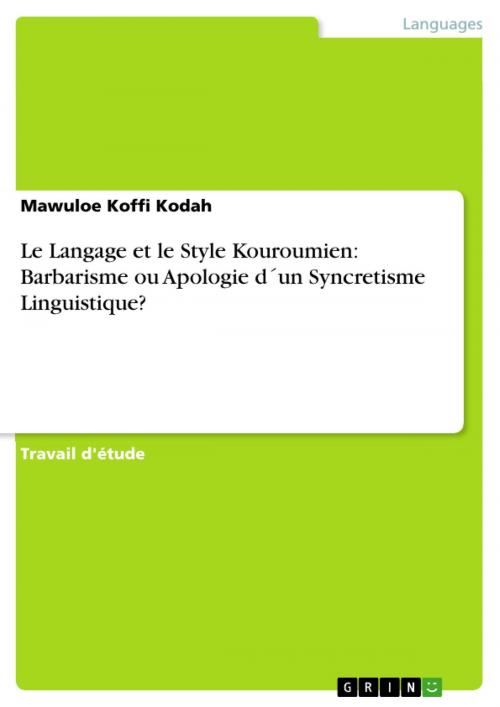Le Langage et le Style Kouroumien: Barbarisme ou Apologie d´un Syncretisme Linguistique?
Fiction & Literature, Literary Theory & Criticism| Author: | Mawuloe Koffi Kodah | ISBN: | 9783656129301 |
| Publisher: | GRIN Publishing | Publication: | February 14, 2012 |
| Imprint: | GRIN Publishing | Language: | French |
| Author: | Mawuloe Koffi Kodah |
| ISBN: | 9783656129301 |
| Publisher: | GRIN Publishing |
| Publication: | February 14, 2012 |
| Imprint: | GRIN Publishing |
| Language: | French |
Travail d'étude de l'année 2012 dans le domaine Lettres - Afrique, , cours: Langue et Litterature, langue: Français, résumé: The language and style of Ahmadou Kourouma have been and still remain a great source of controversy for many scholars, following the publication of his very first novel, 'Les Soleils des Indépendances', in 1968. Some have called it barbaric, while others have called it an innovative masterpiece. The same type of language and style characterize the production of Kourouma's subsequent novels, despite the loud and virulent criticisms and vilifications he received as a result. These language and style assume a dizzy prominence in his last but one novel, 'Allah n'est pas obligé.' A reading of Kourouma's novels : 'Les Soleils des Indépendances', 'Monnè, Outrages et Défis', 'En Attendant le vote des bêtes sauvages', ' Allah n'est pas oblige' et 'Quand on refuse on dit non', leaves one bewildered by the linguistic and artistic tapestry that marks the texts in their entirety. This novelist harmoniously interweaves the French language with Malinke, his mother tongue, especially, and some other African languages in an attempt to distinguish himself from many of his predecessors. The mosaic nature of the diction, together with the strangeness of the syntactic structure of the language, projects the stylistic peculiarity of this novelist. Hence, they become a source of attraction for scholarly reflections beyond the purist perspective of grammarians. This paper seeks to re-ignite the unending debate in literary and linguistic circles by asking whether the language and style of Kourouma are a barbarism or an apologetic stand for a linguistic syncretism, a precursor of real globalization. Refuting the former, the paper seeks to postulate the latter. It therefore argues that, what makes of literature 'Literature' is not a slavish respect of dogmatic principles but a bold stride by a writer towards harmonizing various linguistic and artistic resources in an aesthetic perspective. The paper reaffirms the committed desire in Kourouma to assert the symbiotic coexistence of languages and cultures for a real and sustainable human advancement and peace.
Travail d'étude de l'année 2012 dans le domaine Lettres - Afrique, , cours: Langue et Litterature, langue: Français, résumé: The language and style of Ahmadou Kourouma have been and still remain a great source of controversy for many scholars, following the publication of his very first novel, 'Les Soleils des Indépendances', in 1968. Some have called it barbaric, while others have called it an innovative masterpiece. The same type of language and style characterize the production of Kourouma's subsequent novels, despite the loud and virulent criticisms and vilifications he received as a result. These language and style assume a dizzy prominence in his last but one novel, 'Allah n'est pas obligé.' A reading of Kourouma's novels : 'Les Soleils des Indépendances', 'Monnè, Outrages et Défis', 'En Attendant le vote des bêtes sauvages', ' Allah n'est pas oblige' et 'Quand on refuse on dit non', leaves one bewildered by the linguistic and artistic tapestry that marks the texts in their entirety. This novelist harmoniously interweaves the French language with Malinke, his mother tongue, especially, and some other African languages in an attempt to distinguish himself from many of his predecessors. The mosaic nature of the diction, together with the strangeness of the syntactic structure of the language, projects the stylistic peculiarity of this novelist. Hence, they become a source of attraction for scholarly reflections beyond the purist perspective of grammarians. This paper seeks to re-ignite the unending debate in literary and linguistic circles by asking whether the language and style of Kourouma are a barbarism or an apologetic stand for a linguistic syncretism, a precursor of real globalization. Refuting the former, the paper seeks to postulate the latter. It therefore argues that, what makes of literature 'Literature' is not a slavish respect of dogmatic principles but a bold stride by a writer towards harmonizing various linguistic and artistic resources in an aesthetic perspective. The paper reaffirms the committed desire in Kourouma to assert the symbiotic coexistence of languages and cultures for a real and sustainable human advancement and peace.















